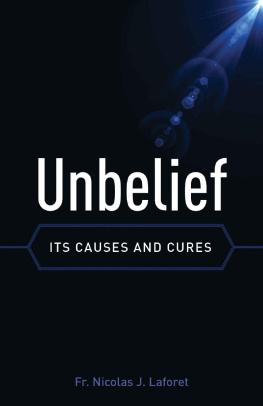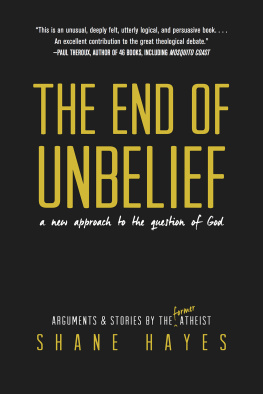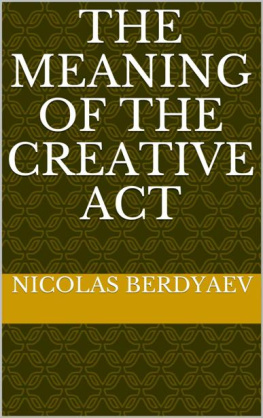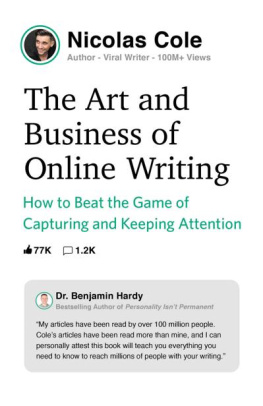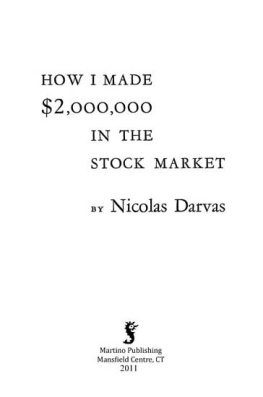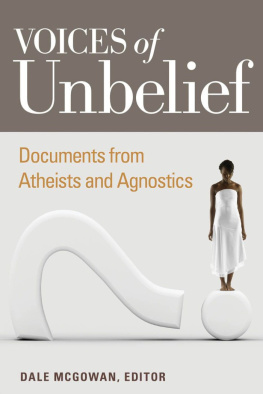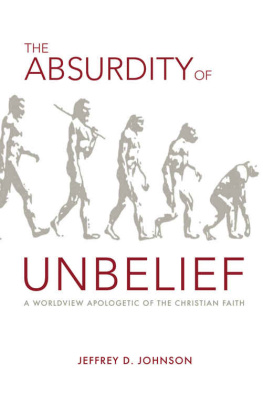Fr. Nicolas J. Laforet - Unbelief
Here you can read online Fr. Nicolas J. Laforet - Unbelief full text of the book (entire story) in english for free. Download pdf and epub, get meaning, cover and reviews about this ebook. year: 2017, publisher: Sophia Institute Press, genre: Religion. Description of the work, (preface) as well as reviews are available. Best literature library LitArk.com created for fans of good reading and offers a wide selection of genres:
Romance novel
Science fiction
Adventure
Detective
Science
History
Home and family
Prose
Art
Politics
Computer
Non-fiction
Religion
Business
Children
Humor
Choose a favorite category and find really read worthwhile books. Enjoy immersion in the world of imagination, feel the emotions of the characters or learn something new for yourself, make an fascinating discovery.
- Book:Unbelief
- Author:
- Publisher:Sophia Institute Press
- Genre:
- Year:2017
- Rating:5 / 5
- Favourites:Add to favourites
- Your mark:
- 100
- 1
- 2
- 3
- 4
- 5
Unbelief: summary, description and annotation
We offer to read an annotation, description, summary or preface (depends on what the author of the book "Unbelief" wrote himself). If you haven't found the necessary information about the book — write in the comments, we will try to find it.
Unbelief — read online for free the complete book (whole text) full work
Below is the text of the book, divided by pages. System saving the place of the last page read, allows you to conveniently read the book "Unbelief" online for free, without having to search again every time where you left off. Put a bookmark, and you can go to the page where you finished reading at any time.
Font size:
Interval:
Bookmark:
Fr. Nicolas J. Laforet
Unbelief
Its Causes and Cure
Revised, enlarged, and edited by
James Cardinal Gibbons
SOPHIA INSTITUTE PRESS
Manchester, New Hampshire
Copyright 2016 by John L. Barger
Unbelief: Its Causes and Cure comprises part 2 of Why Men Do Not Believe (New York, 1909; a translation of Pourquoi l on ne croit pas [Louvain, 1864]). This abridgment of the whole book has been edited slightly to eliminate anachronisms and other anomalies. Unfortunately, the author did not always provide readers with information about persons mentioned or sources quoted. Where possible and appropriate, we have identified them, leaving intact the authors notes where better information could not be found.
Printed in the United States of America. All rights reserved.
Cover design by Perceptions Design Studio.
On the cover: Lighting flare (125975474) Copyright 21 / Shutterstock.com.
Scripture passages in this book are taken from the Douay-Rheims Version of the Bible.
No part of this book may be reproduced, stored in a retrieval system, or transmitted in any form, or by any means, electronic, mechanical, photocopying, or otherwise, without the prior written permission of the publisher, except by a reviewer, who may quote brief passages in a review.
Sophia Institute Press
Box 5284, Manchester, NH 03108
1-800-888-9344
www.SophiaInstitute.com
Sophia Institute Press is a registered trademark of Sophia Institute.
Library of Congress Cataloging-in-Publication Data
Names: Laforet, Nicolas Joseph, 1823-1872, author.
Title: Unbelief : its causes and cure / by Fr. Nicolas J. Laforet ; revised,
enlarged, and edited by Cardinal Gibbons.
Other titles: Why men do not believe
Description: Manchester, New Hampshire : Sophia Institute Press, 2017. |
Originally published under title: Why men do not believe, 1869.
Identifiers: LCCN 2016050684 | ISBN 9781622823963 (pbk. : alk. paper) ePub ISBN 9781622823970
Subjects: LCSH: Apologetics. | Christianity and atheism. | Atheism. |
Skepticism. | Irreligion.
Classification: LCC BT1212 .L3413 2017 | DDC 202 dc23 LC record available at https://lccn.loc.gov/2016050684
Contents
Preface
It is useless to deny that in Christian communities many men are to be found who no longer believe in Christianity. Many even, not content with rejecting the religion of Jesus Christ, go on to deny God; or if they do not deny Him in express terms, their idea of Him is radically false, and they seek to place upon the altar of the living God, the Creator of heaven and earth, a philosophical idol, ten thousand times vainer than the idols of wood and stone to which pagan nations offered incense.
Whence comes this infidelity?
According to those who pride themselves on being philosophers or critics, the denial of Christianity, or even of a personal and living God, is dictated by science and reason; it is, they say, the natural and legitimate fruit of intellectual progress; rationalists, spiritualists, materialists, atheists, pantheists, skeptics of every kind all alike appeal to science and reason to justify their belief or their doubts in the eyes of the public, and even apparently to their own conscience.
I willingly bear this testimony to learned unbelievers of every shade, that they can shelter their infidelity under the finest and noblest pretexts. I have no intention here to examine or discuss those scientific and philosophical pretexts that they call decisive and unanswerable reasons. This has been done elsewhere, and Catholic writers continue to do so daily with the authority that belongs to true learning. I am going to attempt another method.
I have often reflected, sometimes with wonder, always with sadness, on the phenomenon of infidelity in the midst of the light of Christianity. I have frequently asked myself, in the sincerity of my heart, why so many men many of whom are noble-minded, serious, learned reject the teaching of the Catholic Church, the organ and representative of our Lord Jesus Christ upon earth why certain minds, rather than submit to the authority of the Church, will descend to a total denial of the moral and religious order, and even to universal doubt. In this fact there is certainly matter for psychological and moral study of high importance and melancholy interest.
I know very well that in the eyes of infidels this fact appears the simplest and most natural thing in the world. I know that they affect to place their infidelity under the direct and exclusive patronage of science and philosophy. But I am convinced that science and philosophy are in no way interested in the hostile or indifferent attitude that they assume toward the Christian Faith.
Christians have always possessed, and still, thank God, possess, as large a measure of science and philosophy as infidels. Infidelity depends on other causes. What these causes are I propose now to make the object of my inquiry. I cannot hope to bring to light all the real causes of infidelity. There are some that necessarily escape the eye of the observer, however attentive he may be. There are mysteries in the depths of the human soul that the eye of God alone can penetrate. But it is easy for anyone who has had an opportunity of closely observing believers and unbelievers, and of studying their history, to recognize the principal and ordinary causes of infidelity.
In the first part, after a few words on the preaching of Jesus Christ, and the opposite effects produced by it, we shall mark, by a few examples, the principal phases of the twofold history of the Christian Faith, and of unbelief in the bosom of Christianity. This history will afford us valuable lessons; it will show us how men become, how they remain, and how they cease to be Christians. We shall see, by the experience of eighteen centuries of the human mind, whether the source of infidelity can possibly be the development of reason and the progress of intelligence.
In the second part, relying on the lessons of history and on psychological and moral observation, we shall seek to unfold the real causes of religious unbelief. We shall begin by defining the nature of faith and the nature of infidelity; we shall then analyze the principal forms of contemporary infidelity, and we shall seek to distinguish the diverse and often complex conditions of the soul, to which they attach themselves, or by which they are produced.
We trust that God will make use of these pages, humble though they be, to confirm some souls in the happy possession of the Faith, and to rescue others from the corroding bitterness of doubt, or from the gloomy, icy void of unbelief, leading them back to the bright and sweet repose that Christian Faith alone can give.
See James Gibbons, The Faith of Our Fathers: Being a Plain Exposition and Vindication of the Church Founded by Our Lord Jesus Christ .Notice to the Second Edition
This book has already produced consoling fruits. God has used it as His instrument to bring back many wandering souls to Christian faith and practice.
The Sovereign Pontiff, Pope Pius IX, had foretold this result in a letter addressed to the author a few weeks after the publication of this work. We give a translation of this letter.
Letter of Pope Pius IX
Illustrious and Reverend Sir:
To the more considerable works which you have already published you have added one which, though small in size, will, as its title promises, prove of the greatest utility. For, as in the art of healing the body its diseases are treated with the greatest ease and security when their true cause is known, so may the maladies of the soul be best and most effectually resisted and cured when their origin has been ascertained. As the plague of unbelief, which is the principal evil of our day, proceeds either from corruption of heart, or from the languor of religious feeling, or from the madness of pride, to discover such causes and to bring them to light by tearing from them the veil under which they disguise their shameful deformity will assuredly be a powerful aid to souls, helping them reject error and gain free access to truth.
Next pageFont size:
Interval:
Bookmark:
Similar books «Unbelief»
Look at similar books to Unbelief. We have selected literature similar in name and meaning in the hope of providing readers with more options to find new, interesting, not yet read works.
Discussion, reviews of the book Unbelief and just readers' own opinions. Leave your comments, write what you think about the work, its meaning or the main characters. Specify what exactly you liked and what you didn't like, and why you think so.

